INTRODUCTION
It's no secret that there are several storage choices out there for use with a desktop PC (or even a laptop) from the all-time classic regular mechanical drives up to the new solid state hybrid drives (HDD+SSD combo) and solid state drives. Things however become quite more complicated when looking for a NAS (Network Attached Storage) oriented model since there are many things one has to pay attention at aside performance and reliability such as power consumption, temperatures and even noise levels. Of course that's also why all the players in the market have launched their very own "solutions" for NAS users but much like everything else in the PC industry not all are created equal. With us today we have what is perhaps the most promising mechanical hard drive in the market today developed primarily for use with NAS servers, the Enterprise NAS HDD 6TB by Seagate.
Founded in 1979, Seagate is the leading provider of hard drives and storage solutions. From the videos, music and documents we share with friends and family on social networks, to servers that form the backbone of enterprise data centers and cloud-based computing, to desktop and notebook computers that fuel our personal productivity, Seagate products help more people store, share and protect their valuable digital content. Seagate offers the industry’s broadest portfolio of hard disk drives, solid-state drives and solid-state hybrid drives. In addition, the company offers an extensive line of retail storage products for consumers and small businesses, along with data-recovery services for any brand of hard drive and digital media type. Seagate employs more than 50,000 people around the world.
As many of you know to address the issues of power consumption, interior temperatures and noise levels manufacturers choose the easy way out and reduce the RPM of the drive from the "typical" 7200 most consumer desktop drives use down to 5900 and sometimes even 5400. Of course as expected this solution does work but at the same time this hinders the performance of the drive so although for home use a NAS doesn't require the best possible performance when we move to enterprise environments (and even small business ones) performance does matter. With that in mind Seagate chose the "hard" path so the Enterprise NAS HDD spins at 7200RPM, wears a total of 128MB onboard cache and features cutting edge technologies like AcuTrack and PowerBalance in order to increase reliability resulting to a very good MTBF (Mean Time Between Failures) of 1.2 million hours (most other NAS drives have 1). How all these translate in real use well isn’t that what we're here for?
SPECFICATIONS AND FEATURES

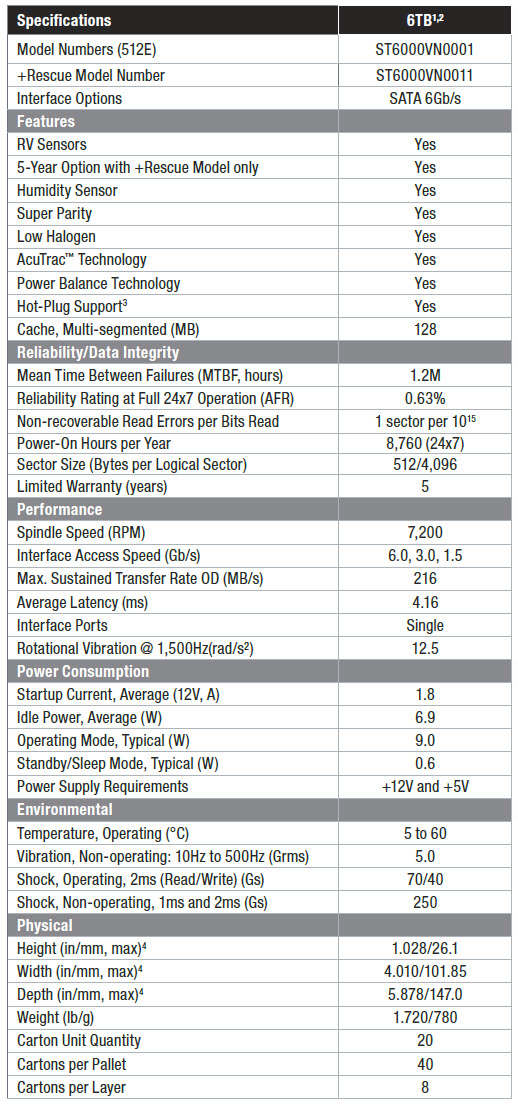
THE ENTERPRISE NAS HDD 6TB
Well nothing new in terms of packaging since once again we received the drive in the usual plastic enclosure (bulk).
Appearance-wise the Enterprise NAS HDD is just another 3.5" drive without anything "special" to set it apart others.
Typically at the top of the drive we see a large sticker with the drive product number, serial number, electrical requirements, warning/certification logos, connectivity, country of manufacture, installed firmware version and the coded factory roll out date (2014-11-02).
Turning the drive over we see that all of the modules are placed on the interior of the PCB for increased protection (the housing used in the Enterprise NAS HDD seems to be the same as with the Enterprise Capacity V4).
At the rear of the drive we see the usual SATA power and data connectors and 4 pins probably used for firmware updating.
TEST BED
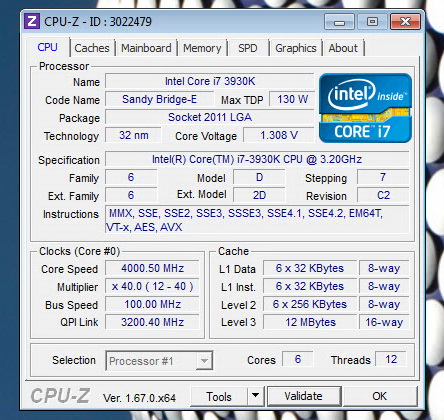

TESTING METHODOLOGY
Thoroughly testing hard disk drives may require time and patience but that's just about it. Of course that doesn't mean that one must take it lightly, at least not when people base their decision on your results. True some choose to only use 2 or 3 benchmarking suits in order to measure the performance of a drive or drives since quite honestly most benchmarking suites do tend to agree with each other (so it's not really wrong) but we always like to take things a step further not because we have to but because we want to be almost 100% certain of the results we get and post in our charts.
So in this kind of reviews we will use a total of 7 different benchmarking suites in an effort to bring you the most accurate results across the board. Now the only reason why i say effort is because real-world usage is not always on par with what results one gets by running several benchmarks on a drive and that's mainly because there are many variables at work from ambient temperatures to hardware configurations and even firmware versions. The benchmarking applications we use are the AIDA64 suite (former Everest Pro), HD Tune Professional, HD Tach RW, ATTO, Sisoftware Sandra Pro, Crystal Disk Mark 64bit and the PCMARK 7 (secondary storage suite). These benchmarking tools are the best in what they do and as you will also see later on their results more or less agree. Each test is performed a total of 6 times and then the average is recorded into the charts. Temperatures are recorded using Hard Disk Sentinel and after 45 minutes of continuous testing in a 23 degrees Celsius temperature controlled room. Finally we also use an ExTech HD600 dBA meter on each of the drives (5cm away) in order to accurately record their noise levels (during access), although if you don't turn off all system fans when doing so it's quite possible that you will never even hear the drive. The operating system as usual is a fresh installation of Microsoft Windows 7 Ultimate Service Pack 1 with every update installed up until the 18th of April 2015.
TEST RESULTS - AIDA64 / ATTO
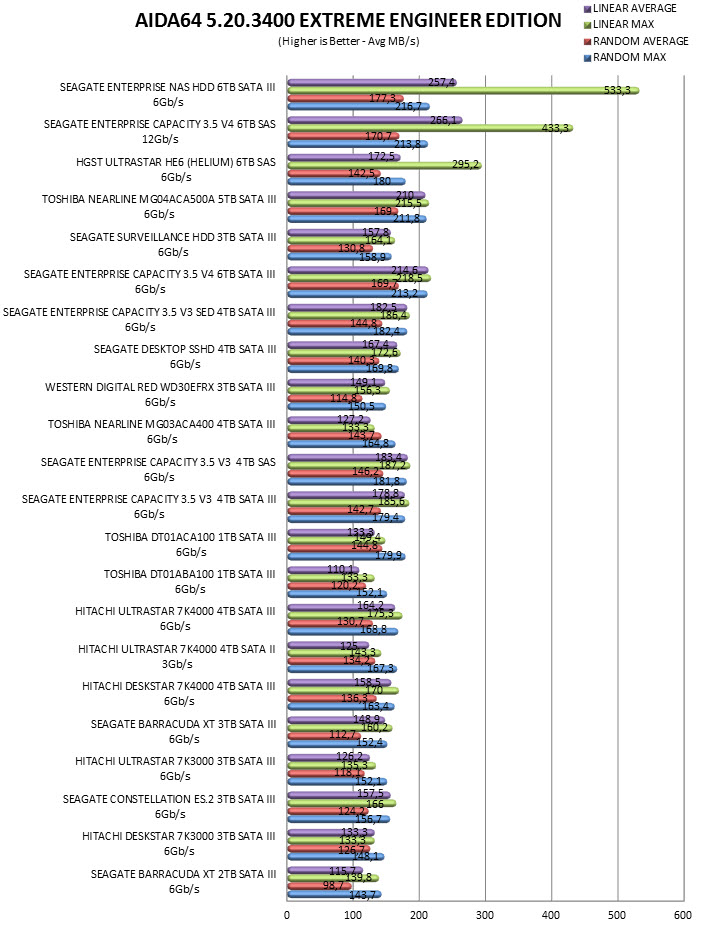

TEST RESULTS - HD TACH RW / HD TUNE PRO
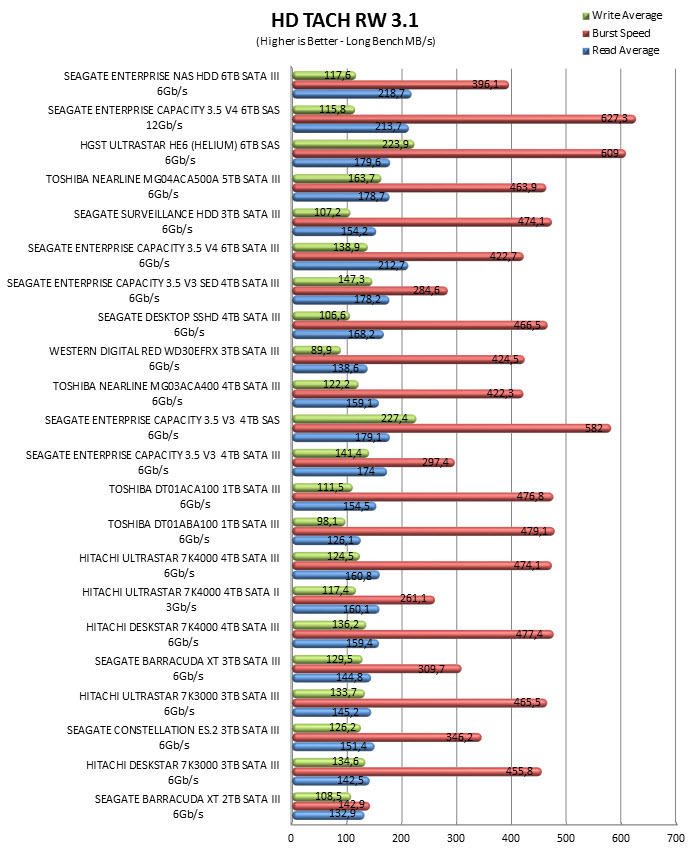
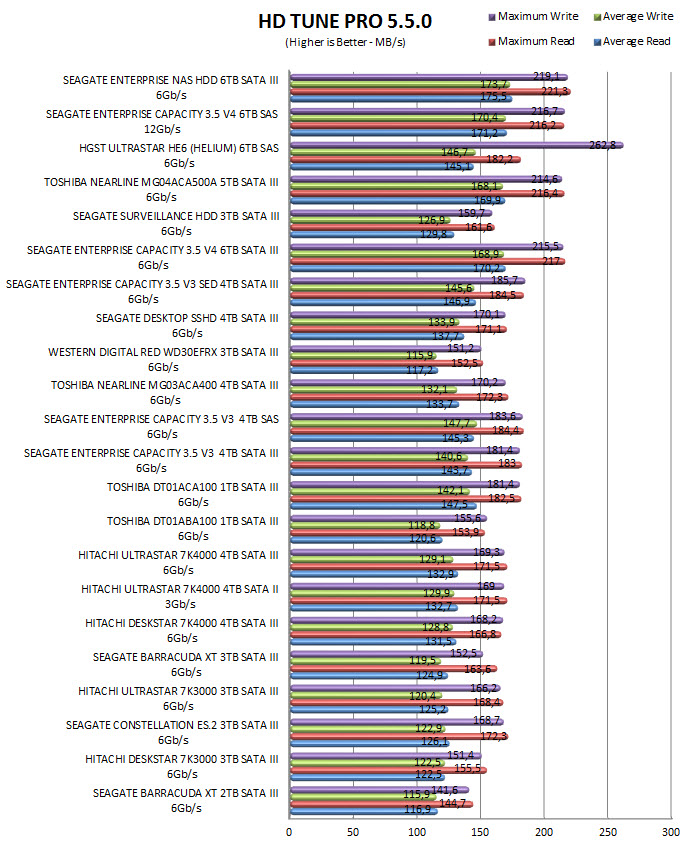
TEST RESULTS - SISOFTWARE SANDRA PRO / CRYSTAL DISK MARK X64
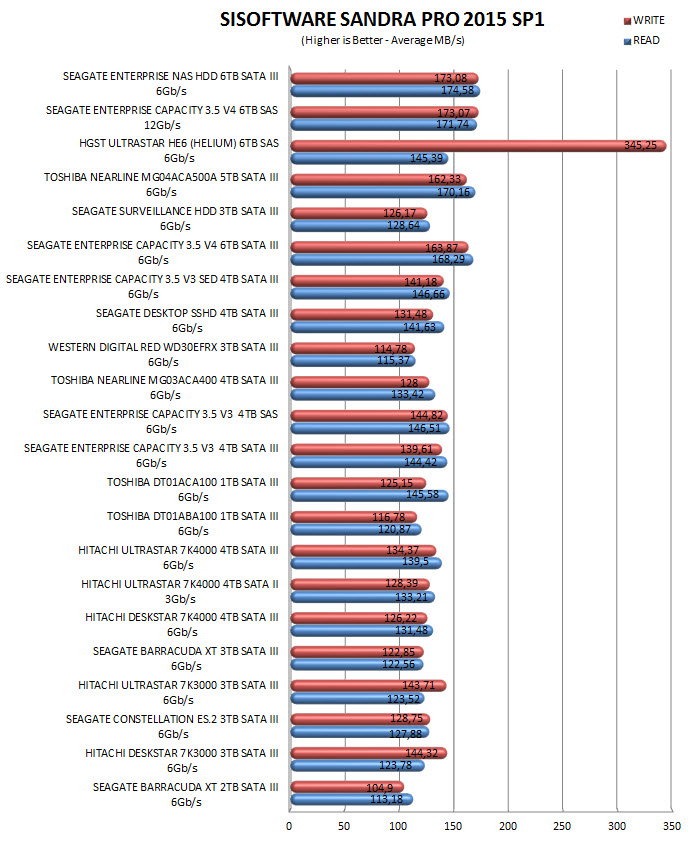

TEST RESULTS – PCMARK 7 / TEMPERATURES / NOISE LEVELS
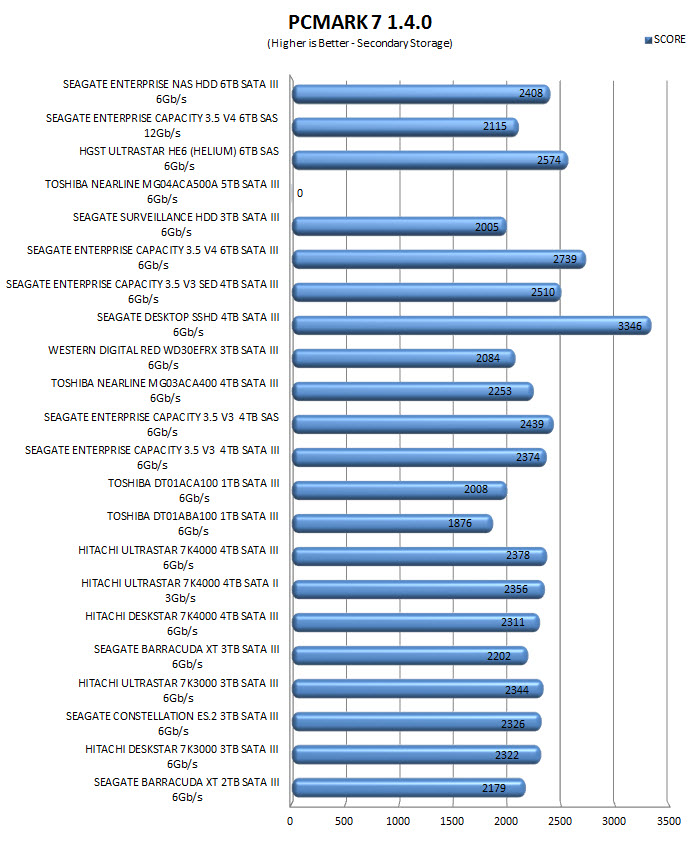
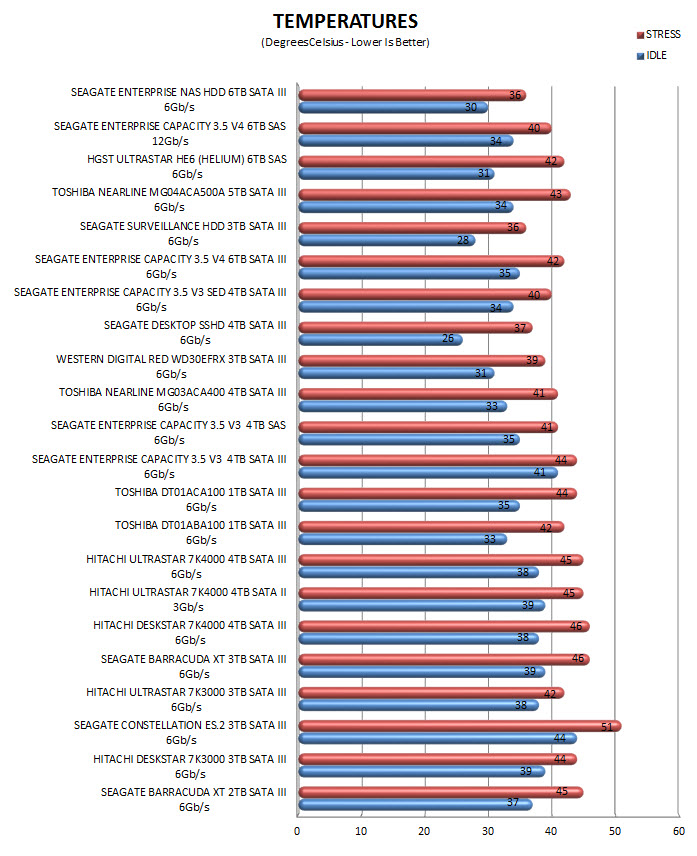
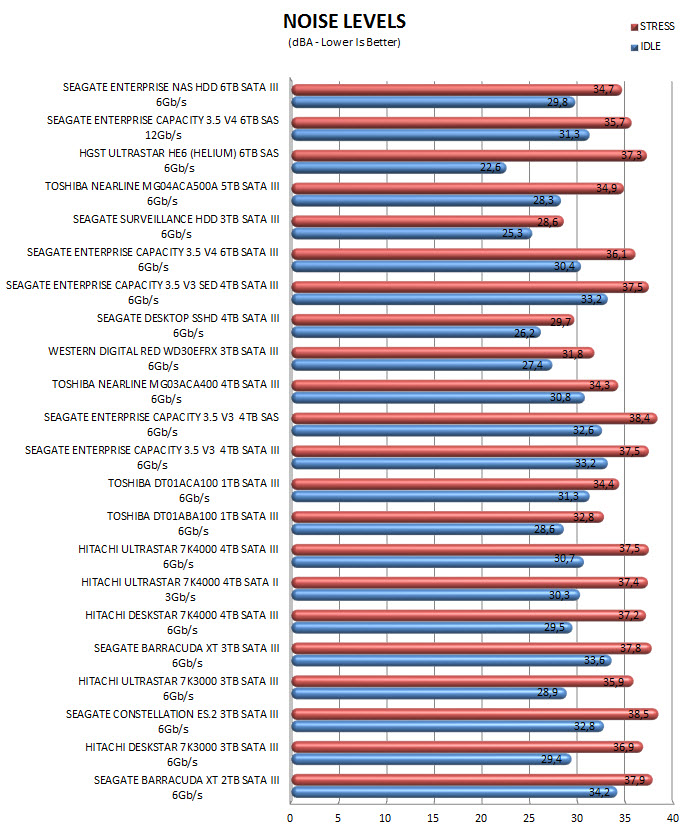
CONCLUSION
It goes without saying that boosting such specs the Enterprise NAS HDD by Seagate is certainly not the most power efficient (green) NAS drive in the market but as you can clearly tell by our charts not only is it a lot faster compared to the 3TB RED drive by WD which we reviewed a while back (the 6TB variant should however be slightly faster) but it also follows closely (in some tests it's even faster) the fastest SATA III HDD in the market currently, the Enterprise Capacity 3.5 V4 again by Seagate. Now i don't know why Seagate (or any HDD manufacturer for that matter) would release a NAS oriented HDD which could rival and even surpass their best enterprise desktop drive in some tests (perhaps a V5 model is in the works?) but with such performance levels we really can't complain. Temperatures and noise levels are also at somewhat low levels and although we've seen better numbers in the past these are very good for a 6TB model.
Price is perhaps the only area where Enterprise grade HDDs don't do very well and with a current price tag set at USD364.38 inside the USA (Amazon.com) and at 426Euros inside the EU (Amazon.co.uk) the Enterprise NAS HDD 6TB (ST6000VN0001) by Seagate is roughly 30% more expensive compared to its immediate rival the RED 6TB by WD and 10% compared to the Deskstar NAS 6TB HDD by HGST. Now i can't comment on the Deskstar NAS 6TB HDD since HGST has yet to send any model of that range over to us but compared to the RED HDDs by WD the Enterprise NAS HDD 6TB by Seagate seems to be miles ahead not only in terms of performance but also in terms of reliability and since we believe that these two are enough for demanding users and professionals alike to not care much about that 30% difference in price we're awarding it our Platinum Award.
- Enterprise Class Quality
- 1.2 Million Hours MTBF (Mean Time Between Failures)
- Top Of The Charts Performance
- 6TB's Capacity
- AcuTrack & PowerChoice Technologies
- Temperatures/Noise Levels
- 5 Years Warranty
CONS
- Price (For Some)
- Power Consumption (Compared To The WD RED)

 O-Sense
O-Sense





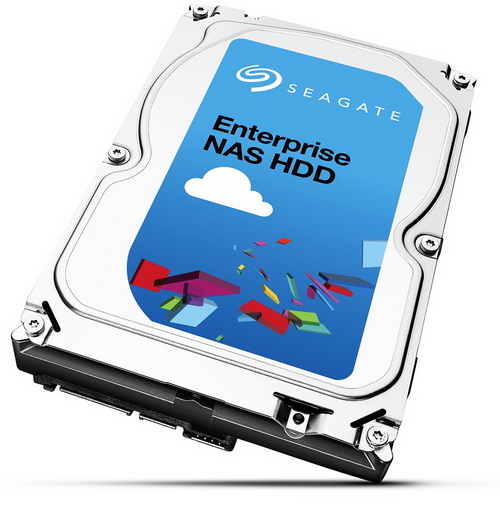
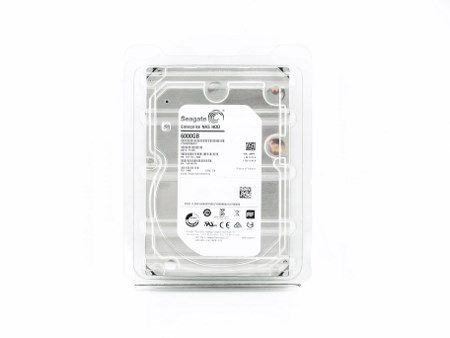
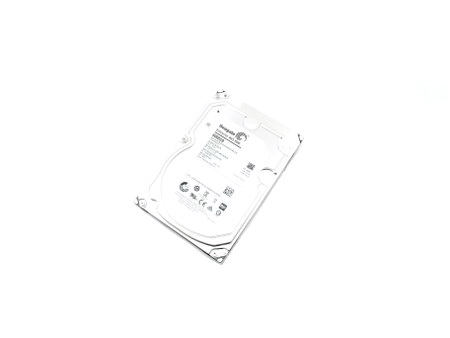
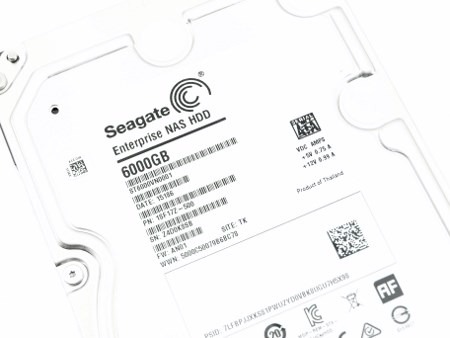
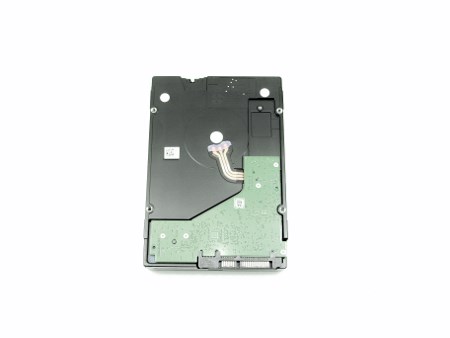
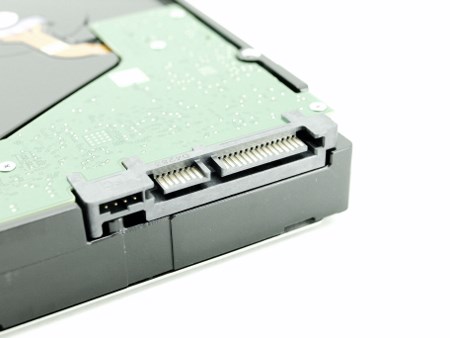
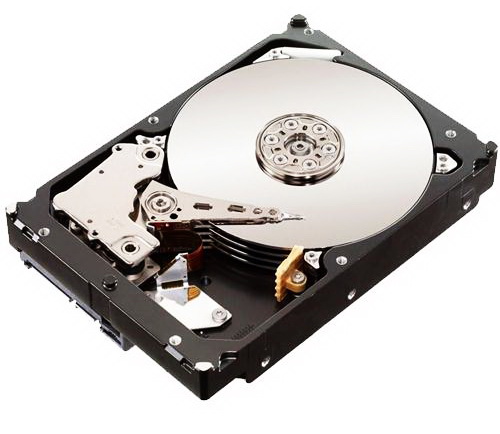



.png)

